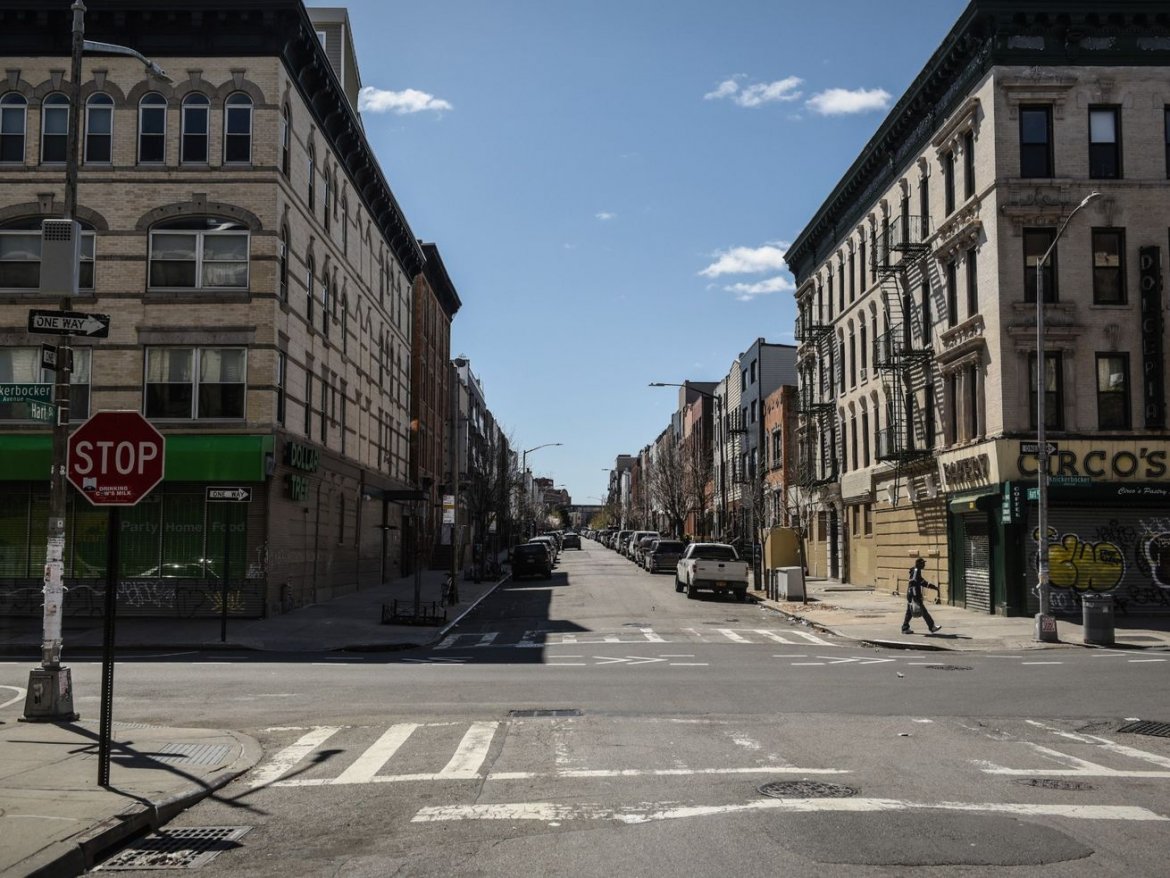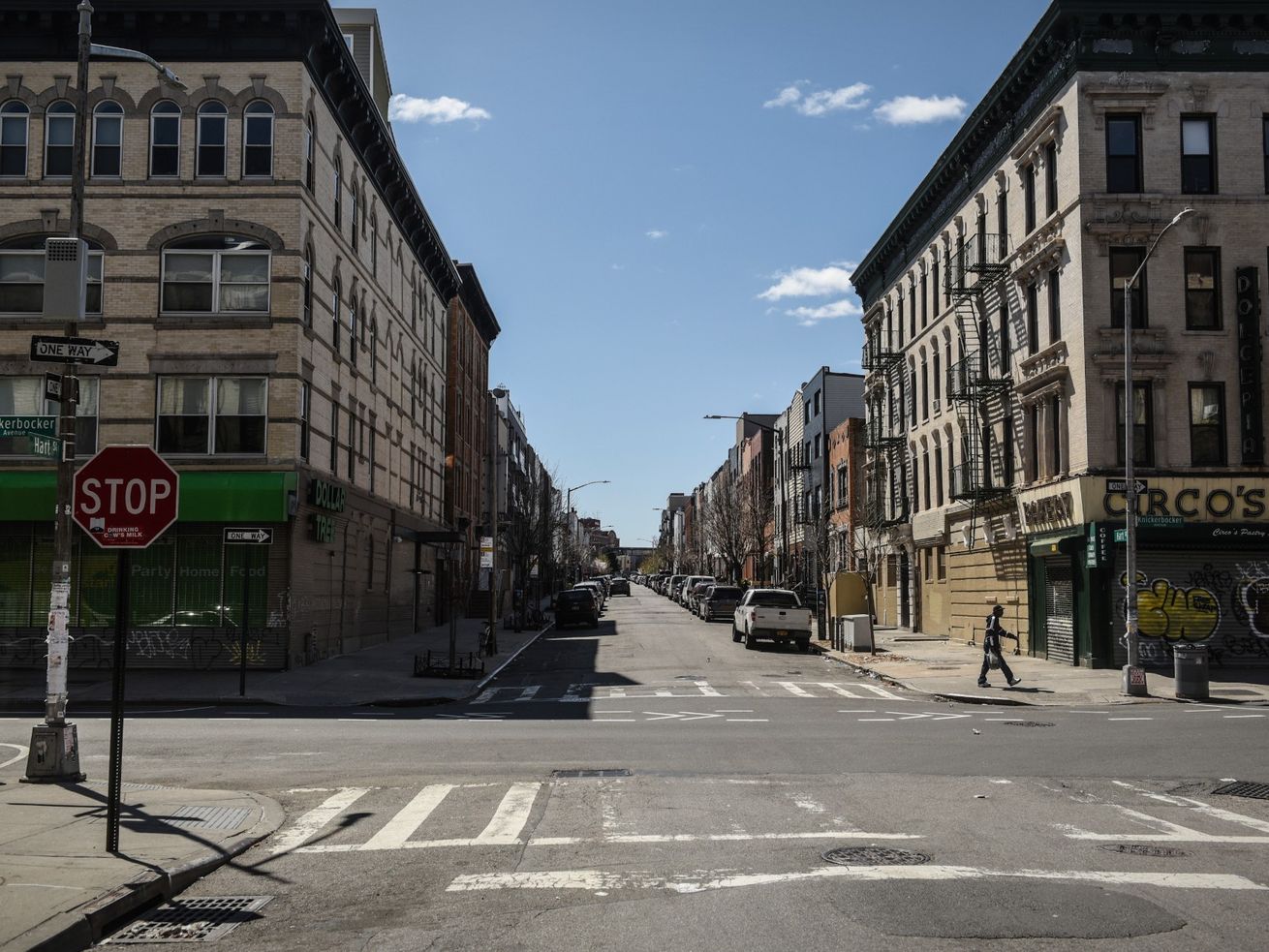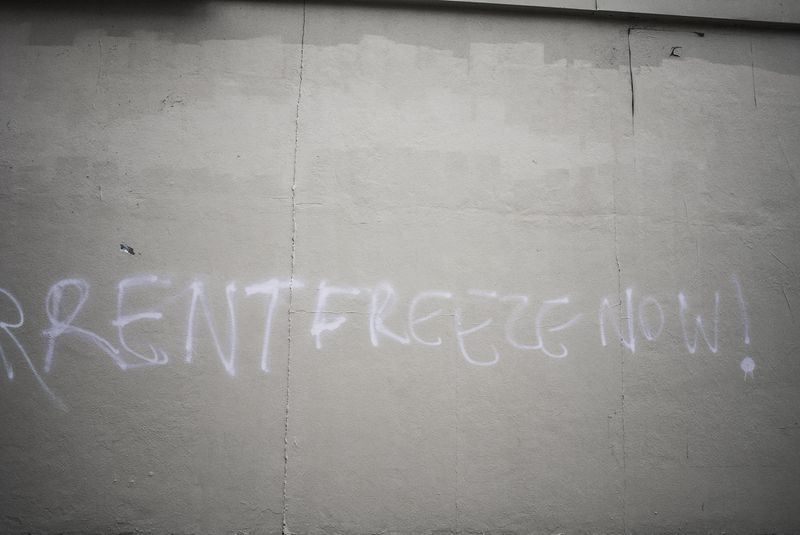
‘Do I pay rent or do I have money to live?’

 Renters are facing economic uncertainty because of the COVID-19 pandemic. | Photo by Stephanie Keith/Getty Images
Renters are facing economic uncertainty because of the COVID-19 pandemic. | Photo by Stephanie Keith/Getty Images
New York City renters are grappling with tough decisions and mulling rent strikes amid the coronavirus pandemic
On the first of every month, Eduardo, a graphic designer, walks the three blocks from his Astoria apartment building and drops his rent check for $2,100/month into his landlord’s mailbox. But on April 1, there was no check.
Work has dried up, and a new roommate who was set to move into Eduardo’s two-bedroom apartment pushed back his plans. That left him with an impossible choice: pay his rent now and drain his bank account, or take advantage of the statewide eviction moratorium by holding on to what he has and cobble together back rent later. After days of internal debate and back and forth with his landlord, he decided to hold off on paying his rent.
“Things were tight to begin with, so now it’s literally, do I pay rent or do I have money to live?” says Eduardo, who asked that his last name be withheld. “I don’t have family who can help. I don’t know when I’ll see unemployment money. So right now, I’m doing what I have to. It makes me extremely nervous, but I don’t know what else to do.”
Situations like Eduardo’s are playing out across New York as the COVID-19 pandemic continues to hammer at the state’s economy. More than 366,000 people filed for unemployment in the week of March 22, compared to some 15,800 at the same time the year prior, according to data from New York’s Department of Labor (DOL).
Some relief is on the way in the form of a one-time $1,200 check for those earning under $75,000 through the federal CARES Act, but those checks aren’t expected to roll out until April 17 at the earliest. And with many New Yorkers paying upwards of $3,000/month for a market-rate apartment, that payment won’t cover rent.
The economic uncertainty means hard decisions about rents are being made across the five boroughs. Several tenants who spoke to Curbed say they are attempting to negotiate deals with their landlords, digging into their savings accounts, or borrowing money from friends. Others are strategically withholding rent to stretch out the rapidly shrinking balance of their bank accounts, or not paying because they simply do not have the money.
Jeanie, a freelance stylist, initially paused automatic payments to the management company of the Highbridge building where she rents a one and a half bedroom apartment for $1,800/month. After joining an informational Zoom call hosted by the Freelancers Union, she had a change of heart and paid her rent, terrified that withholding would snowball into insurmountable debt.
“I have savings so I’m dipping into money I really shouldn’t be touching,” says Jeanie, who also asked that her last name be withheld for fear of straining her relationship with her landlord. After days of navigating the DOL’s crash-prone website to file for unemployment, she was told parts of her application need to be completed with a representative over the phone. Dozens of frustrating calls later, she is no closer to a completed application.
“It’s scary. I have mornings where I just cry,” says Jeanie. “It’s just not fair that we still have to pay rent. This isn’t fair for anyone. It’s not my fault that I’m not working.”
Some frustrated renters have resorted to organizing rent strikes. Typically, tenants collectively withhold rent from a landlord (often putting payments into a building-wide escrow account) as leverage to force repairs or other concessions. But amid the novel coronavirus pandemic, a rent strike has taken on a political purpose.
On April 1, Housing Justice for All—a coalition of tenants’ rights groups including the Met Council on Housing, New York Communities for Change, and Make the Road—hosted a virtual training for those interested in launching rent strikes. That culminated with the group releasing a “toolkit” with tips on how to safely connect with neighbors during this time, as well as guidance on how to approach landlords. The toolkit urges those looking to take collective action to aim for May 1, “to align with buildings across the state.”
“Rent strikes have the power to build consciousness and to build political power to demand that the state cancels rent,” Susanna Blankley, a tenant organizer with Right To Counsel NYC, said during the training session. “This is a political crisis and it needs a political response.”
State lawmakers have introduced legislation that would suspend rent payments for 90 days for residential and commercial tenants suffering financial hardship because of the pandemic. That bill would also offer mortgage relief to the landlords of qualifying tenants. But Gov. Andrew Cuomo has so far resisted calls to offer renters relief beyond a statewide eviction moratorium. Tenant advocates argue that strikes could galvanize support for a rent suspension by putting economic pressure on landlords—and thus forcing the state to act. (Tenant leaders are quick to note that such actions come with legal risks and should be weighed carefully.)
Some tenants have already launched actions while others are in the midst of mobilizing. Elan Cohen, a tenant leader with Woodside on the Move, gathered signatures from neighbors in his 100-unit Sunnyside building asking the management company to temporarily cancel rent. The company was not receptive to the idea, according to Cohen.
“The truth is, whether we can work from home or not, in the upcoming weeks and months and perhaps over the next year we will all have to make very difficult financial decisions that will probably impact us for a very long time,” says Cohen. “My hope is that in the short term, doing our best to conserve our financial resources now will allow us to make a better recovery. In the long run, going broke from rent payments while we’re all struggling to deal with COVID-19 will have a far greater catastrophic impact on us.”
That’s a sentiment shared by several who are making moves to organize their buildings. Up until two weeks ago, Oscar Martinez had barely interacted with the neighbors of his Lower East Side apartment building. But after he lost his job as a manager at a clothing store, he began slipping notes under his neighbors’ doors with his email and a question: “What do you think about a rent strike?” To his surprise, a handful or neighbors responded and are open to exploring the idea.
“We haven’t reached a consensus on anything yet, but talking to my neighbors and hearing that we’re all in the same boat and they’re thinking about these things too made me feel less alone,” says Martinez, who paid his April rent and says he is currently surviving off of “dollar ramen, canned tuna, and the kindness of my neighbors.”
 Photo by Bill Tompkins/Getty Images
Photo by Bill Tompkins/Getty ImagesOthers say they don’t have much choice in the matter and just can’t afford rent right now. Alisa Glem lost her job as a server at a Crown Heights restaurant two weeks ago. After several attempts, she managed to apply for unemployment online, but later found out that she isn’t eligible for benefits and hasn’t been able to get through to a representative on the phone.
“It’s not like at the end of the [eviction moratorium] I’ll miraculously be able to pay rent again and make up what I owe,” says Glem. “I want to pay my rent. I feel horrible. I don’t want to owe anyone. But what else am I supposed to do when I can’t work?”
For many, there is a sense that the eviction moratorium is only delaying the inevitable and that in three months time they’ll be just as, if not more, vulnerable with few options to make up back rent. And even though New York renters cannot be evicted for three months, some tenants are still receiving notices that they need to vacate their homes or that their leases will soon be terminated.
Jerome Brooks Jr., a musician who plays piano in a Harlem church, lives in one of the few below-market-rate apartments in his Tribeca building thanks to an affordable housing lottery through the city. After living in the building for just over a year, Brooks says he was horrified last week to discover a letter in his mailbox from Rockrose, his landlord, alleging that he violated the regulatory agreement for his apartment and that his tenancy is being terminated.
The notice, reviewed by Curbed, states that Brooks is “hereby required to quit, vacate and surrender possession of the premise to the landlord on or before April 15, 2020” and without doing so “the landlord will commence appropriate proceedings in the Civil Court of the City of New York to recover possession of the premises.”
A notice such as this is not enough to legally evict a tenant; certain legal proceedings must occur before an eviction order can be issued, none of which can take place during the statewide moratorium on evictions and nonessential court proceedings. But the notice sent Brooks into a panicked search for a new apartment, fearing that he was at imminent risk of losing his home.
“Everyone is at home in quarantine and I’m running around trying to find an apartment,” says Brooks. “Why would you send a letter when you know there’s a mandate to stay at home?”
Paul Januszewski, the vice president for planning at Rockrose, said in an emailed statement that no eviction order has been issued in this case and that the “predicate notice of termination” that was issued is required before legal action can commence. Januszewski stressed that Brooks will not be evicted during the eviction moratorium.
“Rockrose is committed to abiding by the 90-day moratorium on evictions, and in fact prior to the Governor’s moratorium, Rockrose voluntarily and publicly committed to halt evictions of any of our residents for the next 90 days in response to this crisis,” Januszewski said, referring to a pledge made with 28 other building owners and managers not to execute eviction warrants for 90 days prior to Cuomo’s statewide halt on evictions.
But landlords are not immune from that uncertainty; if tenants can’t make rent, landlords, especially smaller ones that operate on small profit margins, will be unable to pay their own bills.
The Rent Stabilization Association (RSA), a trade group that represents some 25,000 landlords and agents, has provided its members with information on government resources, urging them to do the same with their tenants. RSA is also encouraging landlords to negotiate payment plans with tenants who have recently suffered a loss of income, says RSA spokesperson Vito Signorile.
“Given that owners will not be able to start non-payment cases for the foreseeable future and evictions cannot occur for at least three months, it is in the owner’s best interest to try to work out a payment plan if possible for those tenants who can’t pay the full amount now, but may be able to pay in increments,” Signorile said in a statement.
Tapping into security deposits could also be an option, but Signorile notes that “obviously this method is not one-size-fits-all.” The Community Housing Improvement Program (CHIP), another landlord group that represents roughly 4,000 building owners and managers, has encouraged its members to proactively reach out to tenants about creating payment plans, waiving late fees, and setting up new ways for tenants to pay rent, such as through credit cards.
“We’re taking it day by day,” says Jay Martin, CHIP’s executive director. “No one really knows frankly how long this is going to last, so right now, it’s a real patchwork of owners doing what they can to work with tenants.”
Some have heeded that advice. Wavecrest Management, which oversees roughly 18,250 apartments in more than 300 buildings across New York City, is unable to forgive rent altogether “in order to fulfill our own obligations including mortgages, taxes, utilities, maintenance and management,” according to Susan Camerata, the company’s CFO. But the firm has eliminated all late fees and penalties for those who can’t afford to pay rent in full and is working with tenants on a “case-by-case basis” to set up payment plans, says Camerata.
“It remains our top priority to provide safe and affordable homes for our residents—a responsibility that is even more critical at this moment in history,” Camerata said in a statement. “We are absolutely working with residents who are having trouble affording rent in these difficult times.”
While advocates find it encouraging that some landlords are making an effort to work with renters, ultimately, without a major policy solution, they believe the courts will be flooded with eviction cases once the moratorium is lifted, setting the stage for months-long legal battles for tenants to stave off homelessness.
“We need the officials to step up right now and do the right thing,” says Winsome Pendergrass, a tenant leader with New York Communities for Change. “Cancel mortgages, cancel rent, so that we can live.”
Love where you live
Be Heard at Go Home NY
Be heard! Leave your apartment, condo, and coop building reviews at Go Home NY! Know a building's managers are awful? Have the inside line on a perfect building? Anything in between? Express your voice and be heard. Leave a review at Go Home NY.


